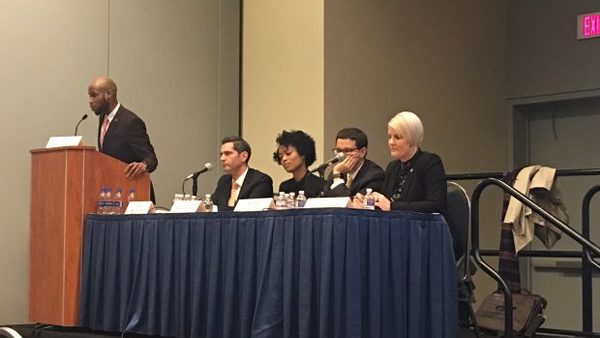 From left to right: CUNA Director of Advocacy Shelton Roulhac, Weedmaps Vice President of Government Relations Dustin MacDonald, Budding Solutions Founder and CEO Shanita Penny, former Colorado Director of Marijuana Coordination Andrew Freeman and Maps CU Chief Risk Officer Rachel Pross.
From left to right: CUNA Director of Advocacy Shelton Roulhac, Weedmaps Vice President of Government Relations Dustin MacDonald, Budding Solutions Founder and CEO Shanita Penny, former Colorado Director of Marijuana Coordination Andrew Freeman and Maps CU Chief Risk Officer Rachel Pross.WASHINGTON – In January when news broke that Attorney General Jeff Sessions had revoked the Cole Memo, Maps Credit Union Chief Risk Officer Rachel Pross ordered $30 million in cash – the same amount the credit union held on deposit for its cannabis business members – from the Federal Reserve and hired more armed security officers for its branches. She had to be prepared to divest the $30 million to those members that same day should Sessions’ action mean a federal crackdown on marijuana businesses, which currently operate legally under state laws. The Cole Memo was developed to shield legalized pot businesses from federal prosecution.
Luckily for Maps and its cannabis business members, FinCEN guidance (which spells out the priorities outlined in the Cole Memo) remains in effect, allowing Pross and her team to continue serving these members – albeit cautiously, she told attendees in a breakout session, “Cannabis, Credit Unions and Service to Communities,” at CUNA’s GAC Tuesday. Board members of the Salem, Ore.-based, $690 million Maps made the decision to begin serving cannabis businesses in 2014, a year before recreational marijuana businesses legally opened their doors in Oregon.
Pross said having an exit strategy in place is critical moving forward, but in the meantime, Maps will keep serving the industry for the purpose of providing community safety and serving the underserved, while continuing its commitment to a robust compliance program. “What we see at Maps is a strong eagerness from these members to comply,” she noted. “These are the types of businesses that we want in Oregon. The more rules we give them, the more legitimate they feel.”
While she emphasized most cannabis business owners are professional and legitimate, she warned credit unions considering entering cannabis banking of an “influx of sketchy players” in the payments and compliance space. “You’ll hear pitches promising a miracle solution [in payments or compliance], and very few of them are legitimate,” she said.
Andrew Freedman, a partner at Freedman & Koski, LLC and the former Colorado director of marijuana coordination, said since the Cole Memo has been revoked, he has not seen an update from FinCEN on the total number of marijuana businesses. But he expects to see a stall on new capital coming into the market, and does not expect to see new financial institutions entering the market.
Pross said she hasn’t heard of any credit unions pulling out of the cannabis industry since the Cole Memo was revoked, but did mention that some armed vehicle providers, which Maps uses to transport large sums of cash, are choosing to no longer onboard new clients.
Freedman also assured that whether the Cole Memo – which was merely “guidance on how to use prosecutorial discretion” – is in effect or not, the DEA cannot afford to prosecute all of the country’s cannabis businesses.
He added, “In the Sessions/Trump era, I have yet to see any direct administrative action against banks or credit unions. I’m not saying don’t be cautious. But I believe this industry will become more banked in the future, not less banked.”


